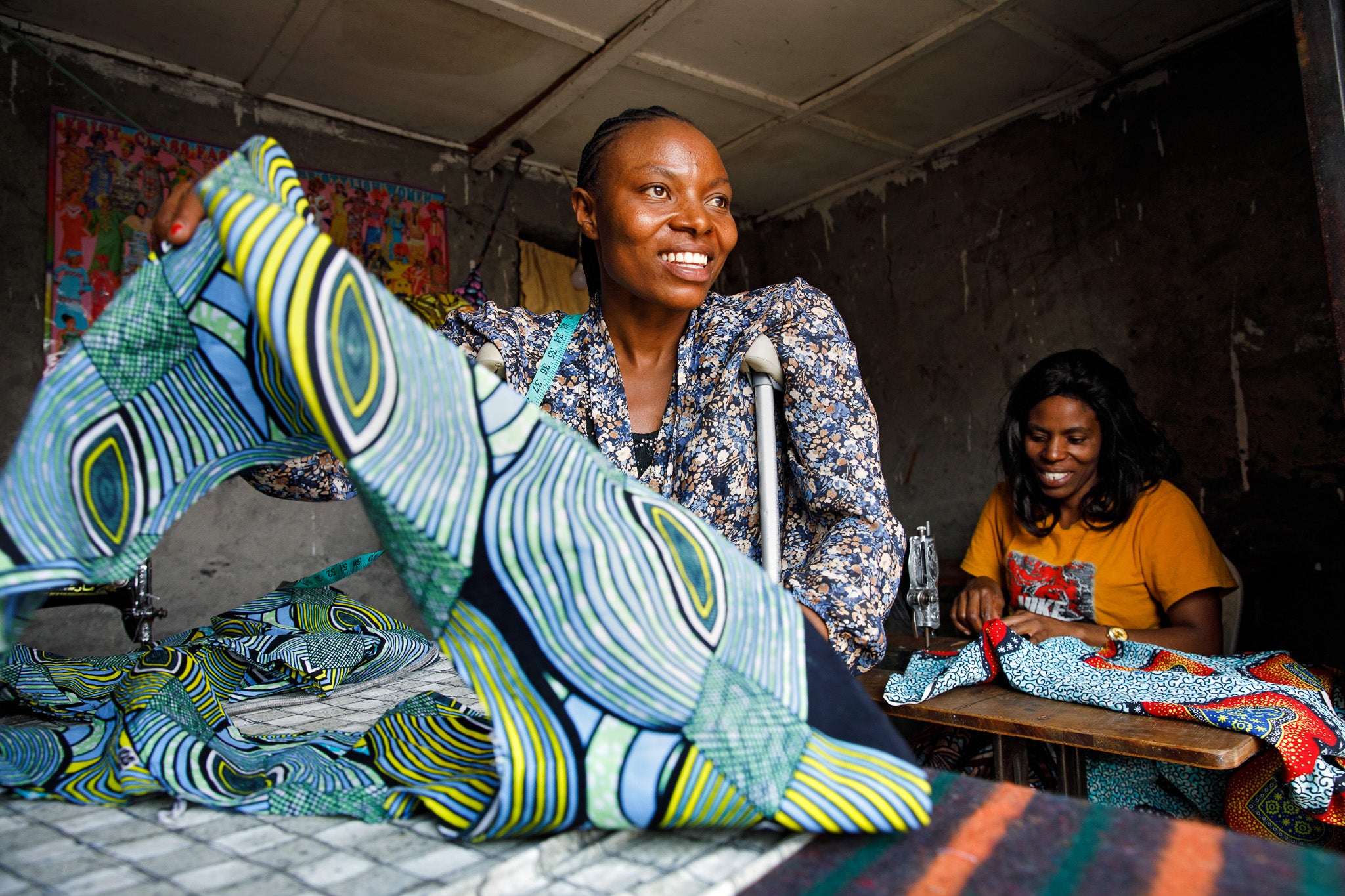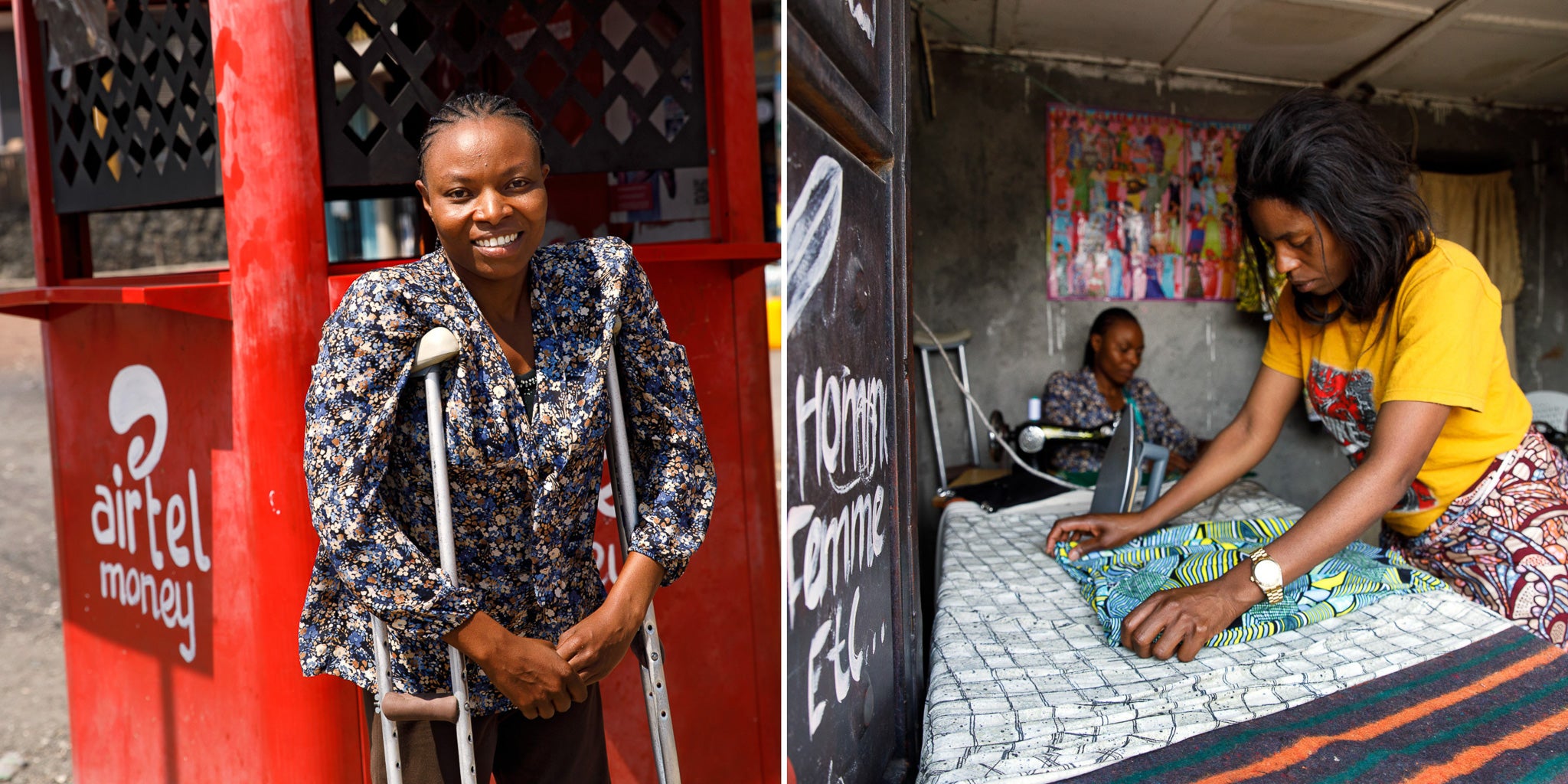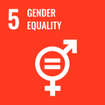From where I stand: “I have the mission of wanting to help others. I hope this young woman is the first of many”
Yvonne Makendo is a mobile unit seller and seamstress from Bukavu, currently living in Goma. A single mother of two, she juggles two jobs with one clear objective in mind: helping other people living with disabilities overcome society’s stereotypes and prejudice. In 2021, the eruption of Mount Nyiragongo in Goma forced Yvonne’s family to flee, subsequently losing their home in the disaster. UN Women, as part of the Humanitarian Action project financed by Japan, provided vulnerable and disabled women affected by the eruption with trainings and funds to restart their economic activity. With UN Women’s support, Yvonne was able to restart her first, and start her second business, and is now working to empower other women like her.
Date:

I am originally from South Kivu, I left Bukavu in 2011 to study university in Goma. I studied commercial and financial sciences. When I finished in 2016 I spent a long time looking for work, but people cared more about my disability than my knowledge and studies.
Then in 2020 I decided to create a small income-generating activity to support myself. I started selling mobile units and earning some money. Nevertheless, in May 2021, everything changed. It was a normal evening like this and one of my brothers had been out since morning. Around 6 p.m. he came back and started asking us why we were still at home, apparently the volcano next to our neigbourhood had just erupted and everyone had started to flee. There was so much movement, everyone was fleeing, in cars, bikes… I started to tremble, I remember suddenly standing up in panic and falling over ! My brothers asked me how we were going to do it with me, how we were going to travel if I couldn’t walk. We also had the children to carry on our backs.
We packed everything we could and started slowly. There were no more buses, there were no more motorcycles. We headed towards Sake. With my disability I couldn't get to Sake on foot, it was impossible. I left but when we got to the terminus I told the others that I couldn’t continue. I sat there until morning. My little brothers continued. All our money fell during the long journey, we had nothing left, all the money I used for the cabin was gone. Eventually we were reunited.
When we were finally able to return to our neighbourhood, there was nothing left of our house.
One day, we were approached by a lady from the ‘woman's house’ of the provincial division of the gender ministry, who told us that she was registering the disabled women who were victims of the volcanic eruption. She told us that we were going to take training at the women's center, because UN Women was helping vulnerable women and women living with a disability get back on their feet.

Happily, I took the training, and I got 220 USD to help me re-start my small business. I was to set up my cabin with UN Women’s help. Shortly after, I decided I wanted to train in cutting and sewing and have my own workshop. For 6 months, after working in the cabin, I would receive training in sowing, then I did a three months internship. When the cabin produced enough, I opened a sewing workshop, my aim was to help people with disabilities learn and work, to take care of themselves.
I started renting this workshop and bought the two second-hand machines, the ones you can see here. I am training a young disabled woman to cut and sow. She practices and receives customers when I am at the Airtel booth. Apart from that, I am a single mother of two boys aged four and two. When I'm working, my sister helps me look after the children until 5 p.m. Afterwards I go home.
My ambition is to teach my fellow disabled people the job, so they can work and be independent. Now, maybe I don't have enough means to produce enough, but I have the mission of wanting to help others. I hope this young woman is the first of many.
I still have many challenges. For my cabin, I currently only cater for one phone network, which limits my clients. Regarding the sewing workshop, soon there will be a return to school. I thought I wanted to start making uniforms, but I don’t really have enough means to buy the materials, the fabrics. I am limited. I can't make ready-to-wear, I need people to bring me the materials they want me to work with. Nevertheless, soon one of my children will be old enough to go to school, and I will send him to school thanks to my two activities. This makes me very proud.
The message I would like to give to other girls living with disabilities is that life is hard, especially if you start from scratch, but I call on them to work and approach other older women living with a disability. We are going to train them, we all start with very little means, but with a little bit of work we can move forward together. We are strong.”

Yvonne’s story of empowerment and resilience and her desire to pass on what she’s learnt reflects the impact to scale that supporting women’s activities has. Stories like Yvonne’s show the importance of Sustainable Development Goal N°5, which aims to achieve gender equality and empower all women and girls.